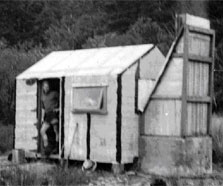Fees
Free
Heritage

Cedar Flat Hut, 1957

The old hut is one of two at the site, the other is a forest service hut built in 1968
This unique hut was built as a base for government employed deer cullers.
Deer were introduced to New Zealand for recreational hunting in the 1850s. By the 1930s deer populations had swelled and organised culling began. The hunters spent months at a time working in isolated locations deep in the wilderness.
Deer cullers’ camps were so remote that building materials and supplies had to be air dropped in or found on site. This rustic hut was built from a mix of sawn air dropped timbers and hand adzed timbers from the
surrounding bush.
Despite some alterations over the last 50 years, Cedar Flat Hut remains the best surviving example of its type on the West Coast. In 1957 four huts were built to this same design; however Cedar Flat is the only one with hand adzed timbers. This style of hut was built prior to the standard NZ Forest Service national models that became common from 1958.
Old craft
The hand worked timber and traditional carpentry methods used in the hut are examples of once common building techniques that are no longer used, and a form of wood working expertise that very
few people now have.
Visit the hut
Cedar Flat is a very popular destination. Today visitors can gain an appreciation of the isolated and rugged lives lead by deer cullers by staying overnight in this rustic hut. The old hut is one of two at the site, the other being a later forest service hut. Nearby are the Wren Creek hot pools, a great place to unwind and see blue duck on the river.
Access to Cedar Flat is along the Toaroha track. The track in follows an old sawmill tram for part of its length; the rest of the track was a 1930s foot track built by the Westland County Council to facilitate access to the hot pools.
DOC's work
Cedar Flat Hut retains a considerable amount of original fabric and best retains the basic aesthetic of this type of hut. DOC maintains the hut for visitor use. Over time the following modifications have been made:
- window and door replaced
- removal of a set of bunks
- addition of the porch
- re-roofed with corrugated iron
- re-piling
- repaired the chimney base and replaced rotten timbers on the chimney framing
- painted the hut ‘rescue orange’ – the original colour of the hut
Further reading
Wild animal control huts: a national heritage identification study
The Toaroha track begins approximately 25km inland from Hokitika.
Tracks to this hut
-
Duration: 4 - 5 days Difficulty: Advanced, Expert
Location
NZTopo50 map sheet: BV19
Grid/NZTM2000 coordinates: E1448532, N5241676
Paparoa National Park Visitor Centre
| Phone: | +64 3 731 1895 |
| Email: | paparoavc@doc.govt.nz |
| Address: | 4294 Coast Road Punakaiki RD 1 Runanga 7873 |
| Hours: | Visitor centre hours and services |
